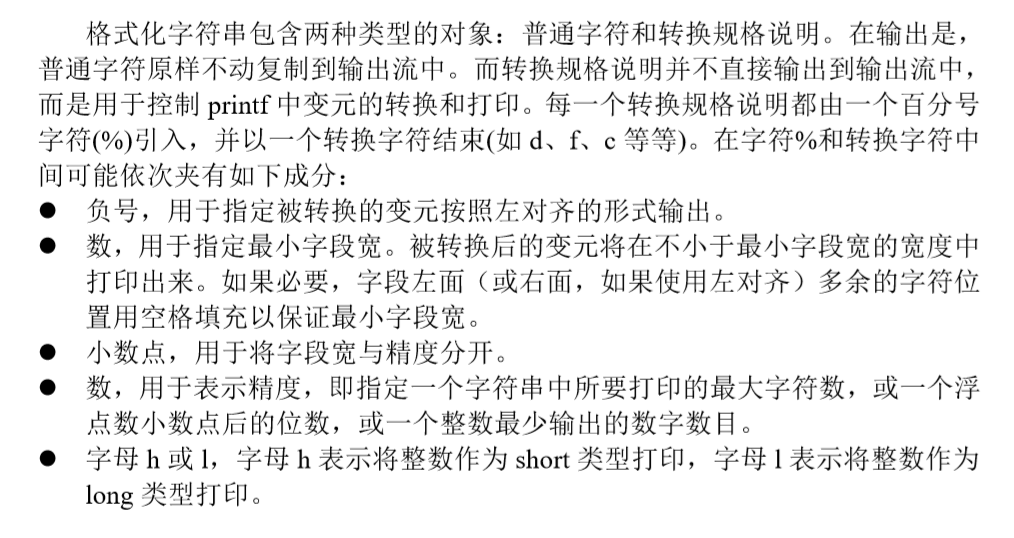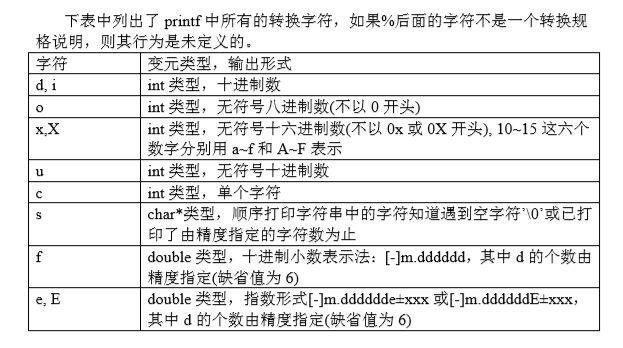手写简化版printf函数
2019.02.01更新:经同学提醒,myprintf函数应有返回值为输出的字符数。
期末的大作业,手写一个myprintf函数,支持如下一些操作。
也就是 % -(负号控制左右对齐) 数(控制字段宽). 数(控制精度) ?(字符,控制类型)



我实现的话就是按上面的实现的,说一下这个简化版存在的问题(简化的地方):
1)%d %i %o %x %X %u %c 这些都默认后面输入的是int,所以long long其实没有用。
2)支持最大精度<=30,如果有需要请更改PRECISION
myprintf默认四舍五入(rounding_off函数实现)
如果发现错误,请指出,谢谢大家啦!
#include<stdio.h>
#include<stdlib.h>
#include<string.h>
#include<math.h>
#include<stdarg.h> #define N 110
#define eps 1e-16
#define INF 1e9
#define PRECISION 30 int maxx(int x,int y){return x>y ? x:y;}
void swapp(char *x,char *y){char t;t=*x;*x=*y;*y=t;}
int find_int_type(int int_type,char ch);
void change_int_type_to_char(int x,int int_type,char *s,int *sl,int *minus);
void print_int_regardless_type(char *s,int *sl,int minus,int Justify_type,int min_width,int precision);
void print_int(int x,int Justify_type,int min_width,int precision,int int_type);
void print_string(char *s,int Justify_type,int min_width,int precision);
int is_g_or_G(char double_type){return (double_type == 'g' || double_type=='G');}
void rounding_off(char *s,int *sl,int *ml,int precision);
void print_double_e_or_E(char *s,int sl,int exponent,int minus,int Justify_type,int min_width,int precision,char double_type);
void print_double_f(char *s,int sl,int ml,int minus,int Justify_type,int min_width,int precision);
void print_double(double x,int Justify_type,int min_width,int precision,char double_type);
int myprintf(const char *format,...); int main()
{
// freopen("a.out","w",stdout);
int a=;
double b=9.9734567;
int count=;
myprintf("%\n");
myprintf("%15e%15e\n",-0.0000123,123.123);printf("%15e%15e\n",-0.0000123,123.123);
myprintf("%f\n",0.0000123);printf("%f\n",0.0000123);
myprintf("%.1E\n",b);printf("%.1E\n",b);
myprintf("%e\n",0.0000123);printf("%e\n",0.0000123);
myprintf("%15.8g\n",0.000012346789);printf("%15.8g\n",0.0000123456789);
myprintf("%5d%10d\n",a,a);printf("%5d%10d\n",a,a);
myprintf("%10.5d%10.5d\n",a,a);printf("%10.5d%10.5d\n",a,a);
myprintf("%15.10hd%15.10ld\n",count,count);printf("%15.10hd%15.10ld\n",count,count);
myprintf("%5o\n",a);printf("%5o\n",a);
myprintf("%f\n",b);printf("%f\n",b);
myprintf("%15f%20.10f\n",-b,-b);printf("%15f%20.10f\n",-b,-b);
myprintf("%15g\n",0.0000123);printf("%15g\n",0.0000123);
myprintf("%15e%15E%15g%15g\n",-b,b,b,0.0000123);printf("%15e%15E%15g%15g\n",-b,b,b,0.0000123);
myprintf("%15g\n",0.0000123);printf("%15g\n",0.0000123);
myprintf("%-15.10x%10.10X\n",count);printf("%-15.10x%10.10X\n",count);
myprintf("%10.5s\n%c\n","asdfghjkl",'a');printf("%10.5s\n%c\n","asdfghjkl",'a');
myprintf("\x41\101 \\ \r\n");printf("\x41\101 \\ \r\n");
unsigned int d = ;
myprintf("%.10u\n",d);printf("%.10u\n",d);
int *p;
myprintf("%p\n",p);printf("%p\n",p);
return ;
} int find_int_type(int int_type,char ch)
{
if(ch=='d' || ch=='i') return int_type;
if(ch=='o') return ;
if(ch=='x') return ;
if(ch=='X') return ;
if(ch=='u') return int_type+;
} void change_int_type_to_char(int x,int int_type,char *s,int *sl,int *minus)
{
*sl=;
switch(int_type)
{
case :{//int
int y=(int)x;if(y<) *minus=,y=-y;
while(y) s[(*sl)++]=(y%)+'',y/=;
break;
}
case :{//unsigned int
unsigned int y=(unsigned int)x;
while(y) s[(*sl)++]=(y%)+'',y/=;
break;
}
case :{//short
short int y=(short int)x;if(y<) *minus=,y=-y;
while(y) s[(*sl)++]=(y%)+'',y/=;
break;
}
case :{//unsigned short
unsigned short int y=(unsigned short int)x;
while(y) s[(*sl)++]=(y%)+'',y/=;
break;
}
case :{//long int
long int y=(long int )x;if(y<) *minus=,y=-y;
while(y) s[(*sl)++]=(y%)+'',y/=;
break;
}
case :{//unsigned long int
unsigned long int y=(unsigned long int)y;
while(y) s[(*sl)++]=(y%)+'',y/=;
break;
}
case :{//o
int y=(int )x;
while(y) s[(*sl)++]=(y%)+'',y/=;
break;
}
case :{//x
int y=(int)x;
while(y) s[(*sl)++]=((y%)>=) ? (y%)-+'a' : (y%)+'',y/=;
break;
}
case :{//X
int y=(int)x;
while(y) s[(*sl)++]=((y%)>=) ? (y%)-+'A' : (y%)+'',y/=;
break;
}
}
} void print_int_regardless_type(char *s,int *sl,int minus,int Justify_type,int min_width,int precision)
{
while(precision<INF && *sl<precision) s[(*sl)++]='';
if(minus) s[(*sl)++]='-';
int space=min_width-*sl; if(Justify_type==)//right
for(int i=;i<=space;i++) putchar(' ');
for(int i=(*sl)-;i>=;i--) putchar(s[i]);
if(Justify_type==)//left
for(int i=;i<=space;i++) putchar(' ');
} void print_int(int x,int Justify_type,int min_width,int precision,int int_type)
{
int minus=(x<) ? :;
char *s=(char *)malloc(N*sizeof(char));
int *sl=(int *)malloc(sizeof(int));
change_int_type_to_char(x,int_type,s,sl,&minus);
print_int_regardless_type(s,sl,minus,Justify_type,min_width,precision);
free(s);
free(sl);
} void print_string(char *s,int Justify_type,int min_width,int precision)
{
int sl=strlen(s);
if(sl > precision) sl=precision;
int space=min_width-sl; if(Justify_type==)//right
for(int i=;i<=space;i++) putchar(' ');
for(int i=;i<sl;i++) putchar(s[i]);
if(Justify_type==)//left
for(int i=;i<=space;i++) putchar(' ');
} void rounding_off(char *s,int *sl,int *ml,int precision)//四舍五入
{
if(s[(*ml)+precision]<='') return;
s[(*ml)+precision-]++;
for(int i=(*ml)+precision-;i>=;i--) s[i-]+=(s[i]-'')/,s[i]=(s[i]-'')%+'';
if(s[]>'')
{
(*sl)++;(*ml)++;
for(int i=(*ml)+precision;i>=;i--) s[i]=s[i-];
s[]=(s[]-'')/+'';
s[]=(s[]-'')%+'';
}
} void print_double_e_or_E(char *s,int sl,int exponent,int minus,int Justify_type,int min_width,int precision,char double_type)
{
int space=min_width-(minus++precision+++);
if(precision) space--;//'.' if(Justify_type==)//right
for(int i=;i<=space;i++) putchar(' ');
if(minus) putchar('-');
putchar(s[]);
if(precision) putchar('.');
for(int i=;i<=precision;i++)
{
if(i>=sl && is_g_or_G(double_type)) break;
putchar((i<sl) ? s[i] : '');
}
putchar(is_g_or_G(double_type) ? double_type+'e'-'g' : double_type);
if(exponent>=) putchar('+');
else putchar('-'),exponent*=-;
putchar(exponent/+'');putchar((exponent/)%+'');putchar(exponent%+'');
if(Justify_type==)//left
for(int i=;i<=space;i++) putchar(' ');
} void print_double_f(char *s,int sl,int ml,int minus,int Justify_type,int min_width,int precision)
{
int space=min_width-(minus+ml+precision);
if(precision) space--;//'.'
if(Justify_type==)//right
for(int i=;i<=space;i++) putchar(' ');
if(minus) putchar('-');
for(int i=;i<ml;i++) putchar(s[i]);
if(precision) putchar('.');
for(int i=ml;i<=ml-+precision;i++) putchar((i<sl) ? s[i]:'');
if(Justify_type==)//left
for(int i=;i<=space;i++) putchar(' ');
} //m.ddddd
void print_double(double x,int Justify_type,int min_width,int precision,char double_type)
{
if(precision==INF) precision=;
int zero=(fabs(x) < eps);
int minus=(x<) ? :;x=fabs(x);
char *s=(char *)malloc(N*sizeof(char));
int sl=,ml=,y=(int)x;x-=y;
if(y==) s[sl++]='';
while(y) s[sl++]=y%+'',y/=;
for(int i=;i<=(sl-)/;i++) swapp(&s[i],&s[sl--i]);
ml=sl;
while(sl<=ml+PRECISION) s[sl++]=(int)(x*)+'',x=x*-(int)(x*);
//f
if(double_type=='f')
{
rounding_off(s,&sl,&ml,precision);
print_double_f(s,sl,ml,minus,Justify_type,min_width,precision);
}
else//e E g G
{
int st=,ssl=,exponent=ml-;
char *ss=(char *)malloc(N*sizeof(char));
while(!zero && s[st]=='') st++,exponent--,s[sl++]='';
for(int i=st;i<sl;i++) ss[ssl++]=s[i]; if(double_type=='e' || double_type=='E' ||
(is_g_or_G(double_type) && (exponent < - || exponent >=precision)))
{
ml=;
if(is_g_or_G(double_type))
{
if(precision) precision--,ssl--;
while(precision && ss[ml+precision-]=='') precision--;
}
int mml=;
rounding_off(ss,&ssl,&mml,precision);
if(mml==) exponent++;
print_double_e_or_E(ss,ssl,exponent,minus,Justify_type,min_width,precision,double_type);
}
else
{
precision-=ml;sl-=ml;
rounding_off(s,&sl,&ml,precision);
while(precision && s[ml+precision-]=='') precision--;
print_double_f(s,sl,ml,minus,Justify_type,min_width,precision);
}
free(ss);
}
free(s);
} int myprintf(const char *format,...)
{
char ch;
int arg_int;
double arg_double;
char *arg_str;
void *arg_p;
va_list ap;
va_start(ap,format); while((ch = *format++)!='\0')
{
if(ch!='%') {putchar(ch);continue;}
//ch = '%' *format = '\0'
if(*format=='\0' || *format=='%') {putchar('%');continue;} int Justify_type=,min_width=,precision=INF,int_type=,ok=;
if(*format=='-') Justify_type=,format++;
while(*format>='' && *format<='') min_width=min_width*+*format-'',format++;
if(*format=='.')
{
format++;precision=;
while(*format>='' && *format<='') precision=precision*+*format-'',format++;
}
if(*format=='h') int_type=,format++;
if(*format=='l') int_type=,format++; if(*format=='d' || *format=='i' || *format=='o' || *format=='x' || *format=='X' || *format=='u')
{
ok=;arg_int=va_arg(ap,int);
print_int(arg_int,Justify_type,min_width,precision,find_int_type(int_type,*format));
}
if(*format=='c')
{
ok=;arg_int=va_arg(ap,int);
putchar(arg_int);
}
if(*format=='s')
{
ok=;arg_str=va_arg(ap,char *);
print_string(arg_str,Justify_type,min_width,precision);
}
if(*format=='f' || *format=='e' || *format=='E' || *format=='g' || *format=='G')
{
ok=;arg_double=va_arg(ap,double);
print_double(arg_double,Justify_type,min_width,precision,*format);
}
if(*format=='p')
{
ok=;arg_p=va_arg(ap,void *);
arg_int=(int)arg_p;
precision=;//默认地址为8位,若机器地址不为8位可更改此处。
print_int(arg_int,Justify_type,min_width,precision,);
}
if(!ok) {putchar('%');format--;}//ch=='%'
format++;
}
va_end(ap);
}
手写简化版printf函数的更多相关文章
- 依据ECMA规范,手写一个bind函数
Function.prototype.bind 函数,参见ECMA规范地址 如题,这次来实现一个boundFunction函数,不挂载在Function.prototype上,而是一个单独声明的函数. ...
- 【OpenCV学习笔记】之六 手写图像旋转函数---万丈高楼平地起
话说,平凡之处显真格,这一点也没错! 比如,对旋转图像进行双线性插值,很简单吧? 可,对我,折腾了大半天,也没有达到预期效果! 尤其是三个误区让我抓瞎好久: 1,坐标旋转公式. 这东西,要用 ...
- 手写事件代理函数 (Delegated function)
‘手写 ’ 这个词 ,面试是不是听过无数遍呢 ! 今天我们来手写一个这样的事件委托函数 => function( parent, selector, type , handle) {} 你需 ...
- 前端面试手写代码——JS函数柯里化
目录 1 什么是函数柯里化 2 柯里化的作用和特点 2.1 参数复用 2.2 提前返回 2.3 延迟执行 3 封装通用柯里化工具函数 4 总结和补充 1 什么是函数柯里化 在计算机科学中,柯里化(Cu ...
- cs224d 作业 problem set2 (一) 用tensorflow纯手写实现sofmax 函数,线性判别分析,命名实体识别
Hi Dear Today we will use tensorflow to implement the softmax regression and linear classifier algor ...
- 手写Function.bind函数
if(!Function.prototype.bind){ Function.prototype.bind = function(oThis){ if(typeof this !=="fun ...
- 手写简化版SpringBoot
Springboot项目全部依赖注解的,web工程是如何启动的 1 首先引入了Tomcat依赖,然后用java代码启动Tomcat容器,默认Tomcat版本是8.5版本 2 Tomcat是实现了ser ...
- 手写map, filter函数
function map(arr, fn) { let newArr = []; for (let i = 0; i < arr.length; i++) { newArr[i] = fn(ar ...
- 22 道高频 JavaScript 手写面试题及答案
实现防抖函数(debounce) 防抖函数原理:在事件被触发n秒后再执行回调,如果在这n秒内又被触发,则重新计时. 那么与节流函数的区别直接看这个动画实现即可. 手写简化版: // 防抖函数 cons ...
随机推荐
- 防止DDoS攻击,每5分钟监控本机的web服务,将目前已经建立连接的IP计算出来,且实现top5。再此基础上,将并发连接超过50的IP禁止访问web服务
netstat -lntupa | grep ":80" | grep ESTABLISHED | awk '{print $5}' | awk -F: '{print $1}' ...
- Oracle 11G RAC For Windows 2008 R2部署手册(亲测,成功实施多次)
总体规划 服务器规划 1.建议使用两台硬件配置一模一样的服务器来作为 RAC 环境的两个物理节点 2.服务器至少需要配置两块物理网卡 3.服务器规划表: 节点 主机名 本地磁盘大小 操作系统 内存大小 ...
- BZOJ3512 DZY Loves Math IV(杜教筛+线性筛)
注意到n很小,考虑枚举i.现在要求的是f(n,m)=Σφ(in) (i=1~m).显然当n没有平方因子时,φ(in)=φ(i)·φ(n/gcd(i,n))·gcd(i,n).利用φ*1=id又可得φ( ...
- hdu3712 Detector Placement
题意:给一束激光,一个三棱柱,三棱柱会折射光,问这束激光最终是否会和y = 0相交: 分析:模拟题,为了方便处理折射角,事先求出每条边的向内和向外的法向量: findpoint : 找第一交点 ste ...
- win10与Ubantu双系统:Linux下开启FTP服务器与创建无线热点(实现文件共享)
如何在win系统下使用filelizza这个软件搭建FTP服务器,然后建立一个无线局域网,让平板终端连接以后,访问电脑硬盘的文件. 如果是只在win7环境下,一切都很简单,按照上文提供的教程就可以实现 ...
- P3701 「伪模板」主席树
题目背景 byx和手气君都非常都非常喜欢种树.有一天,他们得到了两颗奇怪的树种,于是各自取了一颗回家种树,并约定几年后比一比谁种出来的树更加牛x. 题目描述 很快,这棵树就开花结果了.byx和手气君惊 ...
- hbase 跳转过滤器skipfilter
用于跳过整个行键,需要和其他过滤器一起使用,本例SkipFilter和ValueFilter过滤器组合使用过滤不符合条件的行, 如果不配合SkipFiter,ValueFilter只过滤单元值包含的列 ...
- bzoj 1212: [HNOI2004]L语言 AC自动机+状压
为什么这道题网上所有题解写的都是N*Len的trie树的暴力啊,4E的复杂度... 为什么暴力还跑这么快啊TAT.. 有一个O(Len)的做法就是先把AC自动机建出来,因为每个字典串的长度很小,所以我 ...
- laravel queue 修改之后不生效的坑
其实官方文档有说,只是没看仔细. 正常情况下,修改 php 代码是不用重启什么东西的, 但是 laravel 中的 job 不一样, 如果不用 php artisan queue:restart,新 ...
- Laravel 项目集合
1. CMS LaraCMS https://github.com/wanglelecc/laracms 2. 电商 3. 点播 MeEdu https://github.com/Qs ...
